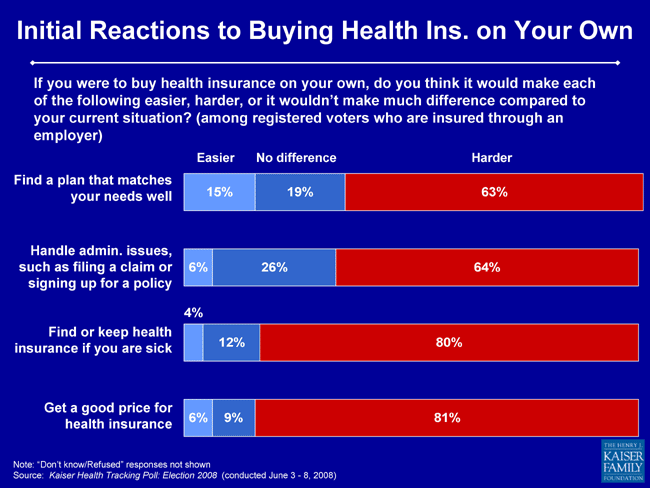Pulling It Together: Moving Away From Employer Based Coverage: Don’t Forget Public Opinion
One of the underlying big issues in the unfolding health reform debate is whether most Americans should continue to get insurance through work where they get it today, or purchase it themselves in the individual private health insurance marketplace. Senator McCain promotes moving to individual insurance and having individuals rather than employers make coverage decisions, as has President Bush. But this is not only a conservative idea. Many on the liberal side — such as Senator Ron Wyden and SEIU President Andy Stern — also would like to see the country move away from the employment-based health insurance system. They see the current tax preference for employment-based health insurance as regressive because subsidies are related to marginal income tax rates and therefore go disproportionately to higher income workers (in fact, a majority of the benefits from the tax exclusion are estimated to go to families with incomes greater than 400% of the poverty level). All are tempted by the $200 plus billion in federal revenues eliminating the tax preference would produce, which could, among other things, be used to pay for covering the uninsured.
Democrats and liberals would take steps to create a more structured market for individual insurance — allowing people to buy into a purchasing pool like the Federal Employees Health Benefits Program or a public plan like Medicare, as well as requiring insurers to accept all comers regardless of pre-existing health conditions. Senator Obama’s health reform plan contains many of these features, but leaves the tax preference for employer-sponsored coverage intact. Conservatives take the opposite approach, relaxing insurance regulations and promoting more unfettered competition, while promoting measures such as high risk pools as a fallback for people with health conditions that would exclude them from non-group insurance.
As discussion of moving away from the employment-based system continues, not very much attention has been paid to a giant question: How will the public (and voters) feel about such a big change? Health reformers have learned the hard way in the past that whatever the appeal of policy proposals on their merits, they ultimately have to be acceptable to the public or they will not fly.
With this in mind, we asked people with employment-based insurance a series of questions on our most recent tracking poll about whether they thought purchasing insurance on their own would make things better or worse for them. You can see the results below. In every case, between 63 and 81 percent said it would make things worse. There were no meaningful differences by party affiliation.
The point is not that moving away from employment-based health insurance is a good idea or a bad one –- polls tell us where the public is at a point in time, not always what is the right thing to do — but that in health reform the burden is always on those who are proposing that people change their current arrangements to persuade the public of why change makes sense and to offer them positive inducements to try something new. For example, in one proposal to switch from employment-based health insurance, the Wyden-Bennett bill, employers are required to substitute higher wages for the tax exemption for employer-paid health insurance, which would disappear. Economists generally believe that eliminating the tax preference for health benefits will result in higher wages over time even without a requirement, as fewer employers contribute towards health coverage and shift compensation towards wages. But in an economy driven by multiple factors, the extent to which this would actually happen — and how quickly — is unknowable.
Advocates of the proposal made by Senator McCain argue that consumers get real advantages from his plan, too. Despite losing the tax preference for their health benefits, they would get in return: a substantial tax credit to help pay for health care, which would be refundable for lower income people; greater health plan choices; and the advantages, as advocates see it, of tax-preferred Health Savings Accounts, including owning their own insurance policies, which would become portable no matter where they worked.
All of the purported advantages of these different approaches to employment-based health insurance will be the subject of a lot of examination and ongoing debate, and new proposals will be made by others. What the poll finding highlights, however, is some initial nervousness people have about purchasing health insurance on their own. And this unease — which opponents will undoubtedly exploit — is a challenge for proposals from the right and the left that would abruptly switch from employment-based insurance. It is an old law of health reform that despite frustrations with the health care system and a general desire among the public for reform, the burden is always on reformers who would change how people get their health care and health insurance today. That’s why the easy answer — though not necessarily the right one — is to assure people that they can keep what they have today.

